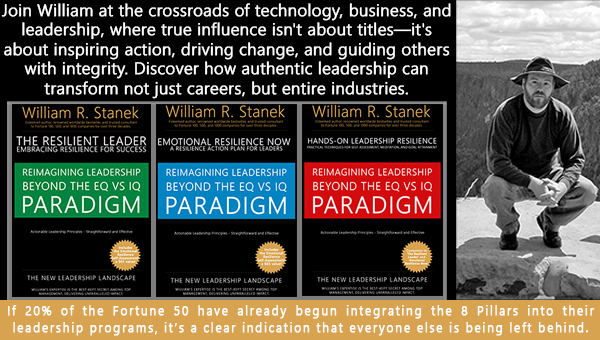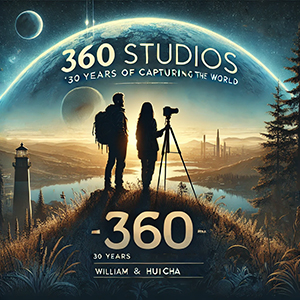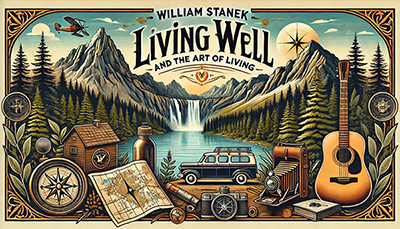
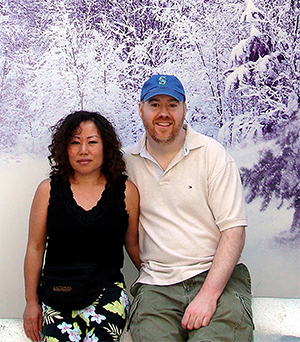
Spotlight on Life's Milestones
Life’s defining moments shape who we are and the paths we take. In this series, William and Hui Cha Stanek invite you to reflect on pivotal milestones, celebrating the journey and the lessons learned along the way.
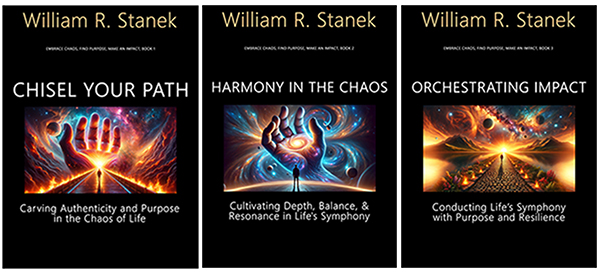
Transform your life with practical wisdom. Discover William Stanek's 'Living Well' series—your guide to a balanced and fulfilling life.
Discover William Stanek's Exclusive Art Collection
Explore and purchase the stunning art featured on this site. Own a piece of William Stanek's unique and captivating artwork today!
(March 12, 2025) Intellectual Milestones: Expanding Your Mind
Intellectual growth is a lifelong journey, one that shapes not only our careers but also our understanding of the world and our place within it. From mastering new skills to achieving significant academic or professional milestones, the pursuit of knowledge enriches our lives, fueling curiosity, creativity, and personal fulfillment. Expanding your mind is not just about accumulating information; it’s about challenging yourself, broadening your perspectives, and continuously seeking to understand more about the world around you. In this article, we’ll explore the milestones of intellectual growth, the impact of continuous learning on personal and professional development, and how these pursuits have influenced our lives.
The Power of Continuous Learning: A Lifelong Commitment to Intellectual Growth
Continuous learning is the cornerstone of intellectual growth. It’s the practice of constantly seeking out new knowledge, skills, and experiences, driven by curiosity and a desire for self-improvement. Whether through formal education, professional development, or self-directed study, continuous learning keeps the mind active, sharpens our critical thinking abilities, and opens up new opportunities in both our personal and professional lives.
For both Hui Cha and me, the commitment to continuous learning has been a defining aspect of our lives. Early in my career, I realized that if I wanted to succeed and grow, I needed to keep expanding my knowledge and skills. This realization led me to pursue formal education, earning degrees that provided a strong foundation for my work. But beyond formal education, I also embraced self-directed learning, exploring topics and skills that intrigued me, even if they weren’t directly related to my career at the time.
One of the most significant milestones in my intellectual journey was the decision to pursue further education while balancing a demanding career. This decision wasn’t easy—there were countless late nights, sacrifices, and moments of doubt—but it was also incredibly rewarding. The knowledge and skills I gained during this period not only enhanced my professional capabilities but also deepened my understanding of the world and my place within it. The pursuit of knowledge became more than just a career move; it became a way of life, a commitment to never stop growing and evolving.
Hui Cha also shares this passion for continuous learning. Throughout her career as an artist, she has consistently sought out new techniques, styles, and mediums to expand her creative expression. This commitment to intellectual and artistic growth has allowed her to evolve as an artist, pushing the boundaries of her work and discovering new forms of expression that she might never have explored otherwise. Her journey is a testament to the idea that intellectual growth is not confined to academia—it can take place in any field, driven by curiosity and a desire to innovate.
The Milestones of Intellectual Growth: Achieving Academic and Professional Success
Intellectual milestones are often marked by significant achievements, such as earning a degree, mastering a new skill, or reaching a professional goal. These milestones serve as both markers of progress and motivators for continued growth. They remind us of what we are capable of achieving when we dedicate ourselves to learning and development, and they inspire us to keep pushing the boundaries of our knowledge and abilities.
One of the most memorable intellectual milestones in my life was the completion of my first major writing project. As a writer, the process of researching, writing, and refining a manuscript was a significant intellectual challenge. It required not only a deep understanding of the subject matter but also the discipline to stay focused and the resilience to handle setbacks and revisions. When the project was finally completed, it was a moment of immense pride and satisfaction—a tangible result of years of learning, effort, and dedication.
This milestone was not just about the finished product; it was about the journey of intellectual growth that led to it. The process taught me valuable lessons about perseverance, critical thinking, and the importance of continuous learning. It also opened up new opportunities in my career, leading to further projects and collaborations that expanded my knowledge and skills even more.
Hui Cha’s intellectual milestones have often been tied to her artistic achievements. Each time she masters a new technique or completes a challenging project, it marks a significant step in her intellectual and creative journey. These milestones are not just about the art itself; they represent the growth and learning that have taken place along the way. They are reminders of her commitment to continuous improvement and her willingness to push herself beyond her comfort zone.
The pursuit of intellectual milestones is not just about reaching a specific goal; it’s about embracing the process of learning and growth. Each milestone is a stepping stone on a much larger journey, one that continues throughout our lives as we seek to understand more about ourselves, our work, and the world around us.
The Impact of Intellectual Challenges: Fueling Creativity and Personal Development
Intellectual challenges are often the catalysts for significant growth and innovation. They push us to think differently, to question assumptions, and to explore new ideas and perspectives. Whether in our personal lives or our careers, these challenges fuel creativity and drive us to achieve things we might never have thought possible.
One of the most impactful intellectual challenges I faced was the transition from military service to civilian life and a creative career. This shift required me to adapt to a completely different environment, to learn new skills, and to rethink the way I approached problem-solving and communication. It was a steep learning curve, and there were many moments of uncertainty and doubt. But it was also a period of intense intellectual growth.
The challenges of this transition forced me to develop new ways of thinking and working. I had to learn to apply the discipline and strategic thinking I had developed in the military to a completely different context. This experience not only expanded my intellectual horizons but also fueled my creativity, leading to new ideas and approaches that I have continued to build on throughout my career.
Hui Cha has also faced significant intellectual challenges in her work as an artist. One of the most notable was the decision to experiment with a completely new medium that she had never worked with before. The process was challenging and often frustrating, as she had to learn entirely new techniques and navigate a steep learning curve. But it was also incredibly rewarding. The experience pushed her to think creatively, to experiment with new ideas, and to expand her artistic expression in ways she hadn’t anticipated.
These intellectual challenges, while difficult, are essential for growth. They push us to step outside our comfort zones, to take risks, and to explore new possibilities. They fuel our creativity, expand our knowledge, and ultimately lead to personal and professional development that enriches our lives.
The Joy of Learning: Embracing Intellectual Curiosity
At the heart of intellectual growth is a deep sense of curiosity—a desire to learn, to explore, and to understand. This intellectual curiosity is what drives us to seek out new knowledge and experiences, to ask questions, and to challenge ourselves to grow. It’s a quality that can be cultivated and nurtured throughout our lives, leading to a rich and fulfilling intellectual journey.
For both Hui Cha and me, intellectual curiosity is a driving force in our lives. It’s what motivates us to pursue new projects, to explore different fields of study, and to continuously seek out opportunities for learning and growth. This curiosity is not confined to our professional lives; it extends to all aspects of our existence, from our personal interests and hobbies to our relationships and interactions with the world.
One of the ways we cultivate intellectual curiosity is by embracing a mindset of lifelong learning. We view every experience as an opportunity to learn something new, whether it’s a formal educational course, a new creative project, or simply a conversation with someone who offers a different perspective. This mindset keeps us engaged with the world around us, always looking for new ways to expand our understanding and grow intellectually.
Another important aspect of cultivating intellectual curiosity is being open to new ideas and perspectives. This means being willing to challenge our own beliefs and assumptions, to explore topics outside our usual areas of interest, and to engage with people who have different viewpoints. This openness not only broadens our intellectual horizons but also enriches our lives by fostering a deeper understanding of the world and our place within it.
The joy of learning is not just about acquiring knowledge; it’s about the journey of exploration and discovery. It’s about the excitement of encountering new ideas, the satisfaction of mastering a new skill, and the fulfillment that comes from continuous growth and development. By embracing intellectual curiosity, we can lead lives that are rich in knowledge, creativity, and personal fulfillment.
Embracing Intellectual Growth: Steps to Expand Your Mind and Achieve Your Goals
Intellectual growth is a lifelong journey, one that requires a commitment to continuous learning, a willingness to embrace challenges, and a deep sense of curiosity. By embracing the milestones of intellectual growth, you can expand your mind, achieve your goals, and lead a life that is rich in knowledge and fulfillment.
Here are a few steps you can take to embrace intellectual growth and expand your mind:
-
Cultivate a Mindset of Lifelong Learning: Embrace the idea that learning doesn’t stop when formal education ends. Seek out opportunities for learning in all areas of your life, whether through courses, books, conversations, or new experiences.
-
Set Intellectual Goals: Identify specific intellectual milestones you want to achieve, such as mastering a new skill, completing a degree, or exploring a new area of interest. Setting goals gives you a sense of direction and motivation in your intellectual journey.
-
Embrace Intellectual Challenges: Don’t shy away from difficult or unfamiliar topics. Embrace intellectual challenges as opportunities for growth and creativity. These challenges often lead to the most significant breakthroughs in knowledge and understanding.
-
Stay Curious: Cultivate a sense of curiosity about the world around you. Ask questions, explore new ideas, and be open to different perspectives. Intellectual curiosity is the driving force behind continuous learning and growth.
-
Reflect on Your Learning: Take time to reflect on what you’ve learned and how it has impacted your life. Reflection helps to reinforce your learning and allows you to see how your intellectual growth is contributing to your personal and professional development.
-
Share Your Knowledge: One of the most rewarding aspects of intellectual growth is the ability to share your knowledge with others. Whether through teaching, mentoring, or simply engaging in meaningful conversations, sharing your knowledge helps to reinforce your learning and make a positive impact on others.
The Transformative Power of Intellectual Growth: Living a Life of Knowledge and Fulfillment
Intellectual growth is a transformative force that shapes our understanding of the world, enhances our creativity, and contributes to a rich and fulfilling life. By embracing the milestones of intellectual growth, you can expand your mind, achieve your goals, and lead a life that is rich in knowledge and personal fulfillment.
For Hui Cha and me, the journey of intellectual growth has been one of the most rewarding aspects of our lives. It has allowed us to continuously expand our knowledge, to achieve significant milestones in our careers, and to lead lives that are rich in curiosity, creativity, and personal fulfillment. As we continue on our journey of living well, we remain committed to embracing intellectual growth, knowing that it is the key to a life of continuous learning and discovery.
A Call to Action: Embrace Intellectual Growth and Expand Your Mind
Intellectual growth is a lifelong journey, one that requires a commitment to continuous learning, a willingness to embrace challenges, and a deep sense of curiosity. By embracing the milestones of intellectual growth, you can expand your mind, achieve your goals, and lead a life that is rich in knowledge and fulfillment.
Here are a few steps you can take to embrace intellectual growth:
-
Adopt a Lifelong Learning Mindset: Embrace the idea that learning is a continuous process that extends beyond formal education. Seek out opportunities for learning in all areas of your life.
-
Set Clear Intellectual Goals: Identify specific intellectual milestones you want to achieve and set clear goals to guide your learning journey.
-
Embrace Challenges as Opportunities: View intellectual challenges as opportunities for growth and innovation. Don’t shy away from difficult or unfamiliar topics.
-
Cultivate Intellectual Curiosity: Stay curious about the world around you. Ask questions, explore new ideas, and be open to different perspectives.
-
Reflect on Your Learning: Take time to reflect on what you’ve learned and how it has impacted your life. Reflection reinforces learning and helps you see the progress you’ve made.
-
Share Your Knowledge with Others: Share your knowledge and insights with others, whether through teaching, mentoring, or meaningful conversations. Sharing knowledge enriches both your life and the lives of others.
Embrace intellectual growth, expand your mind, and continue on your journey of living well.
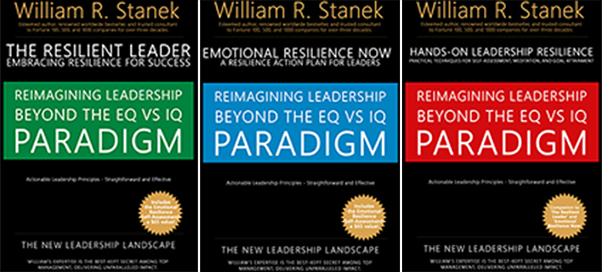
Join William at the crossroads of technology, business, and leadership, where true influence isn't about titles - it's about inspiring action, driving change, and guiding others with integrity. Discover how authentic leadership can transform not just careers, but entire industries.
Bring Inspiration Home
Enhance your space with William Stanek's evocative art. Each piece is crafted to inspire and uplift your everyday life.
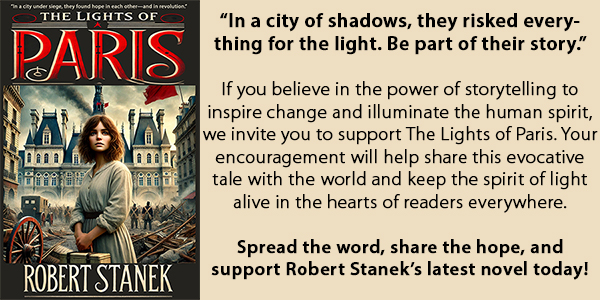
Support The Lights of Paris by Robert Stanek, William Stanek's pen name! Through vivid historical detail and deeply moving character stories, Robert takes readers on an unforgettable journey through one of history’s most transformative times.
